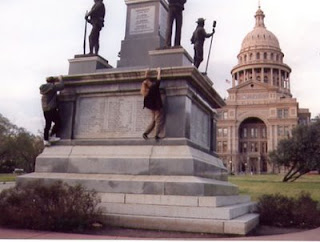 While the rest of the nation was watching President Obama’s State of the Union speech last week, I was moderating a rare and powerful panel discussion on the importance of public relations in government at St. Edward’s University in Austin, Texas.
While the rest of the nation was watching President Obama’s State of the Union speech last week, I was moderating a rare and powerful panel discussion on the importance of public relations in government at St. Edward’s University in Austin, Texas.
One panelist had an additional challenge – she’s a state legislator. In Texas, the state legislature meets for 140 days every other year, and our biennial legislative session is currently underway. Dr. Diane Patrick, a rising star in the Texas House of Representatives (from Arlington), set aside her busy legislative schedule, a committee meeting, and time with her family to join us. Rep. Patrick serves on the Texas Public and Higher Education Committee (among others) and her background is one of educator and community activist. Before she was elected to the Texas House of Representatives, she was a college professor at UT-Arlington.


A sobering moment for me was when Sutton, who prosecutes cyber-crime, pornography, and sex offenses (among other federal crimes), warned my students to be careful when they’re online. He recounted a chilling story about a case in Dallas in which a small “mom and pop” organization had 70,000 subscribers to its child pornography Web site (which brought in about $25 million a year). Roughly 1 in 7 children are preyed upon when they’re online in the safety of their own homes. As great of a tool the Internet might be, it is still a dangerous place for unsupervised children. So parents, put your computers in a centrally located room, like the living room, where kids can be supervised online.

Government benefits from the Internet and its countless powerful and emerging tools for communicating and organizing constituencies. Citizens mobilize online to help countless causes and non-profits. And the more we Tweet or book Facebook time around the world, the more able we will be to make our own decisions about our counterparts on other continents (who are remarkably similar to you and me, it turns out).
The Ambassador said these tremendous movements and interesting financial times have produced a greater demand for transparency, honesty, and accuracy in government communications. People want to know more. They expect more from the institutions that receive tax dollars (and the schools that receive tuition checks). Our country’s actions should align with our ideals. People want to know what’s being done: where, when, and how much it cost us. And people want to know their voices are being heard.

The panelists answered thoughtful questions about the constraints of communicating in their unique jobs, balancing personal values with sworn duties, and public service as a career choice. They left my students with a challenge to never stop seeking truth. They encouraged students to analyze and research ideas; to consider many news sources and read opposing viewpoints. One student asked Mr. Sutton how to become a better communicator. He said, “Be yourself.” He’s right. The rest will follow.
Our discussion was scheduled to conclude in an hour. All four panelists stayed past 9 p.m. (the two-hour mark), and Justice Willett and Mr. Sutton stayed for the entire three-hour class. They answered every last question and offered to be a resource to any of the students who might have additional questions about public service.
I’ve been marveling about this panel, and all the knowledge it imparted. Collectively, the speakers represented about 100 years of noteworthy public service. I was moved by the magnanimity of that moment — by the rare and candid, heartfelt discussion. My students have no idea how lucky they were to have the undivided attention of four spectacularly kind, intelligent, and passionate public servants for three hours on a Tuesday night. But they will someday.
Maine Senator Margaret Chase Smith (1897-1955) said, “Public service must be more than doing a job efficiently and honestly. It must be a complete dedication to the people and to the nation with full recognition that every human being is entitled to courtesy and consideration, that constructive criticism is not only to be expected but sought, that smears are not only to be expected but fought, that honor is to be earned, not bought.”
Indeed.